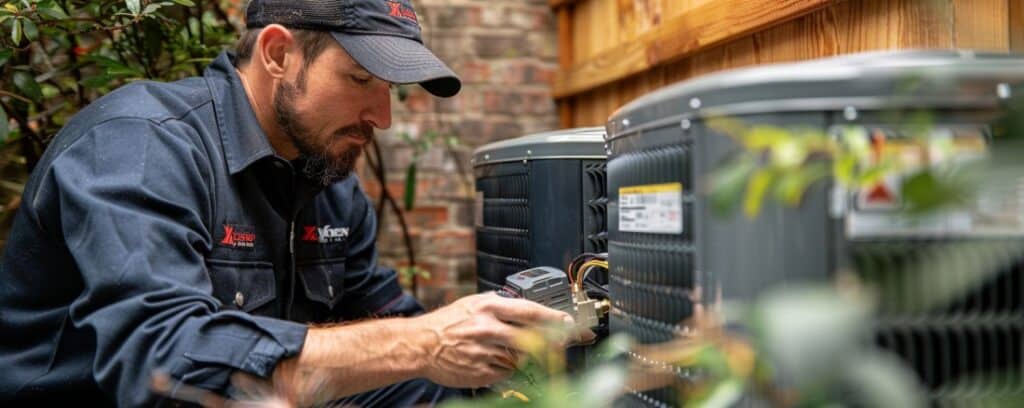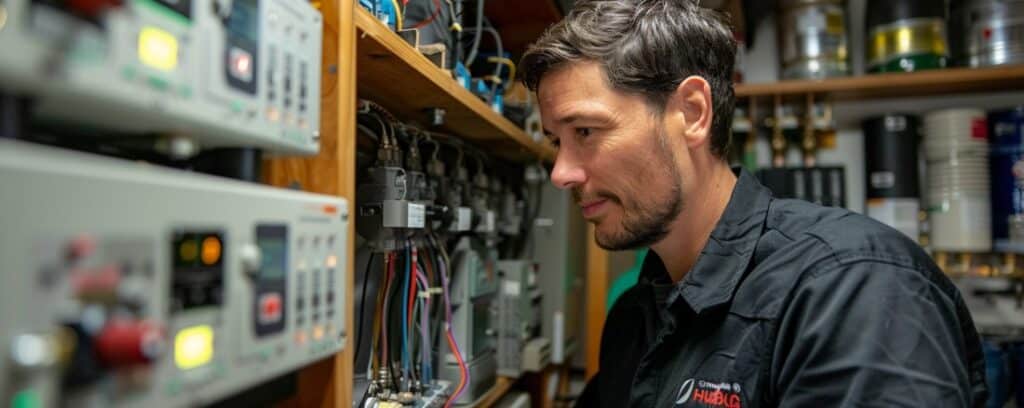- What is an HVAC Journeyman?
- Understanding the Role of an HVAC Journeyman
- The Path to Becoming an HVAC Journeyman
- HVAC Journeyman Salary
- Career Outlook and Advancement
- Job Outlook and Demand for HVAC Technicians
- Job Options and Work Settings
- Essential Skills and Qualities for Success
- Preparing for an HVAC Journeyman Career
The journey to becoming an HVAC journeyman is marked by hands-on learning experiences, rigorous training programs, and a commitment to mastering the trade. It’s a path that promises not just a job but a rewarding career, offering the chance to make a significant impact on the quality of indoor environments and, by extension, on people’s lives.
What is an HVAC Journeyman?
The term “journeyman” has a rich history in the trades and craftsmanship, originating from the French word “journee,” meaning “day.”
Historically, it referred to skilled workers who had completed their apprenticeships and were paid by the day, as opposed to apprentices who received less compensation and were still learning their craft under the guidance of a master.
Journeymen were considered competent and authorized to work independently but had not yet attained the status of a master craftsman who could own a shop and take on apprentices.
While “journeyman” has been traditionally used to describe skilled tradespeople across various industries, including HVAC, the term inherently carries a gender-specific connotation.
In recognition of this, the industry and educational institutions are moving towards more inclusive terminology.
Alternatives such as “journeyperson,” “skilled tradesperson,” or simply “certified technician” are being adopted to more accurately reflect the diversity of individuals working in the trades today.
While the industry embraces more inclusive terminology to represent the skilled professionals in HVAC, for the purposes of this article and search visibility, we will continue to use the traditional term ‘journeyman.’
This in no way diminishes our commitment to recognizing and respecting the diversity of all individuals in the trades.
Understanding the Role of an HVAC Journeyman
The role of an HVAC journeyman encompasses a wide range of responsibilities, all centered around the heating, ventilation, air conditioning, and refrigeration systems that control the temperature and air quality in buildings.
But what does a day in the life of an HVAC journeyman look like, and what skills are essential for success in this role?
The Daily Responsibilities
An HVAC journeyman is responsible for the installation, maintenance, and repair of HVAC systems.
This can involve working on a variety of systems, including residential heating and cooling systems, commercial HVAC units, and industrial refrigeration systems.
Their work ensures that these systems operate efficiently, reliably, and safely, which includes:
- Installing new HVAC systems, including laying out and connecting electrical wiring, installing ductwork, and setting up the main units.
- Conducting regular maintenance checks to ensure systems are operating at peak efficiency, which involves cleaning, replacing filters, and checking fluid levels.
- Diagnosing and repairing problems, from fixing minor issues like leaks or blockages to troubleshooting more complex problems with system components.
Skills and Competencies Required
To excel as an HVAC journeyman, several skills and competencies are crucial:
- Technical proficiency: A deep understanding of HVAC systems and components, as well as the ability to read blueprints and follow technical instructions.
- Problem-solving skills: The ability to quickly diagnose issues and figure out the most effective solutions.
- Physical stamina and dexterity: HVAC work often requires maneuvering in tight spaces, lifting heavy objects, and standing for long periods.
- Customer service skills: Many HVAC journeymen deal directly with clients, necessitating clear communication and a friendly, professional demeanor.
Work Environments
HVAC journeymen work in a variety of settings, including:
- Residential: Working in people’s homes, installing and repairing HVAC systems to ensure comfortable living conditions.
- Commercial: Maintaining and repairing systems in office buildings, schools, and other commercial establishments.
- Industrial: Working on large-scale refrigeration and air conditioning systems in factories, warehouses, and industrial plants.
Becoming an HVAC journeyman opens the door to a career that is not only technically challenging but also deeply satisfying.
These professionals play a critical role in ensuring that our environments are comfortable, safe, and energy-efficient, making this a career path with a significant impact on the quality of life.
The Path to Becoming an HVAC Journeyman
The journey to becoming an HVAC journeyman is structured and rigorous, designed to equip aspiring professionals with the necessary skills, knowledge, and hands-on experience.
This path involves formal education, apprenticeship programs, and obtaining licensure and certifications.
Let’s break down these steps to understand what it takes to embark on a career as an HVAC journeyman.
Education and Training Requirements
High School Diploma or Equivalent
The foundational step toward becoming an HVAC journeyman is obtaining a high school diploma or its equivalent. Courses in mathematics, physics, and vocational education can be particularly beneficial, providing a solid foundation for the technical training that follows.
Vocational or Technical School Programs
Post-secondary education in HVAC technology at a vocational or technical school offers in-depth training in the principles of HVAC systems, including installation, maintenance, and repair.
These programs typically last from six months to two years and may award a certificate or associate degree. Graduates emerge with a strong theoretical understanding and practical skills, making them competitive candidates for apprenticeship positions.
Apprenticeship Programs
Apprenticeship programs are critical in the HVAC field, combining paid on-the-job training with classroom instruction.
These programs, which can last between three to five years, are often sponsored by professional associations, labor unions, or contractor associations.
Benefits of Apprenticeships
- Hands-on experience: Apprentices work under the guidance of experienced journeymen, gaining invaluable practical experience with real-world HVAC systems.
- Income while learning: Apprentices earn a wage while they learn, which typically increases as they gain more skills and experience.
- Comprehensive education: Classroom instruction complements on-the-job training, covering advanced topics in HVAC technology, safety regulations, and blueprint reading.
Licensing and Certification
State-specific Licensing Requirements
Many states in the U.S. require HVAC technicians to obtain a license to work independently. The requirements for licensure vary by state but generally include passing an exam that tests knowledge of HVAC systems and local building codes.
Industry Certifications
In addition to state licensing, various industry certifications can enhance an HVAC journeyman’s qualifications and job prospects.
The Environmental Protection Agency (EPA) Section 608 certification is a must for any technician who works with refrigerants. Other certifications, such as those offered by North American Technician Excellence (NATE) or HVAC Excellence , demonstrate proficiency in specific areas of HVAC technology.
By following this path—completing educational prerequisites, undergoing an apprenticeship, and obtaining the necessary licensure and certifications—individuals can achieve the status of HVAC journeyman, opening the door to a rewarding career in this essential field.
HVAC Journeyman Salary
When considering a career as an HVAC Journeyman, understanding the potential earnings is crucial.
The U.S. Bureau of Labor Statistics (BLS) offers valuable insights into salary expectations for individuals in closely related roles, specifically “Heating, Air Conditioning, and Refrigeration Mechanics and Installers.”
Although the term “journeyman” may not directly appear in the BLS categorization, the data for this group is highly relevant for those looking to gauge the earnings of a skilled HVAC Journeyman.
Understanding the Role and Its Earnings
The median annual wage for heating, air conditioning, and refrigeration mechanics and installers was reported at $51,390 in May 2022, according to the BLS .
This figure represents the midpoint of earnings in this field, meaning half of the workers earned more, while the other half earned less.
This salary comparison becomes even more noteworthy when considering the broader context of installation, maintenance, and repair occupations, which had a median annual wage of $50,080, and the total of all occupations in the U.S. economy, with a median of $46,310.
Earnings can vary significantly within the field, influenced by factors such as experience, geographic location, and the industry in which an individual works.
For instance, those employed in the wholesale trade reported higher median wages of $57,760, followed by positions within educational services, state, local, and private sectors, and retail trade, with respective wages of $54,950 and $54,760.
Conversely, those working for plumbing, heating, and air-conditioning contractors saw slightly lower median wages at $49,630.
Career Outlook and Advancement
The career outlook for an HVAC journeyman is robust, driven by the continuous demand for skilled professionals capable of installing, maintaining, and repairing increasingly complex HVAC systems.
Let’s explore the job prospects, potential for advancement, and the impact of technological advancements on this vital trade.
Job Outlook and Demand for HVAC Technicians
The HVAC industry is poised for significant growth in the coming years, a trend reflected in the positive employment outlook for HVAC technicians, including journeymen.
As reported by the U.S. Bureau of Labor Statistics (BLS) , the sector is expected to experience faster-than-average job growth, driven by several key factors that underscore the demand for skilled technicians.
Projected Growth
The BLS projects that employment for heating, air conditioning, and refrigeration mechanics and installers will grow by 6 percent from 2022 to 2032, outpacing the average for all occupations.
This growth is anticipated to result in about 37,700 job openings each year over the decade.
A substantial portion of these openings will likely arise from the need to fill positions left vacant by workers who retire or transition to different occupations.
Driving Factors
Several dynamics contribute to the projected employment growth in the HVAC field:
- Construction Boom: The construction of new residential and commercial buildings is a primary driver, creating a demand for the installation of new HVAC systems.
- Maintenance and Repair: The ongoing need for maintenance and repair of existing HVAC systems ensures consistent work for technicians, including those at the journeyman level.
- Energy Efficiency and System Upgrades: As older HVAC systems are retrofitted, upgraded, or replaced with more energy-efficient models, skilled technicians are needed to perform these complex tasks. This trend is partly fueled by a growing emphasis on energy efficiency and pollution reduction, reflecting broader societal shifts towards sustainability.
Employment Projections Data
According to the BLS’s Employment Projections program, the HVAC sector is on a robust growth trajectory.
With 415,800 individuals employed as heating, air conditioning, and refrigeration mechanics and installers in 2022, the workforce is expected to increase to 438,800 by 2032, marking a numeric growth of 23,000 jobs.
This expansion underscores the vibrant and evolving nature of the HVAC industry and highlights the promising prospects for individuals pursuing careers as HVAC technicians.
Advancement Opportunities
The journey from apprentice to journeyman marks a significant milestone in an HVAC technician’s career, but it doesn’t end there.
With experience, continued education, and additional certifications, HVAC journeymen can pursue several advancement paths:
- Master Technician: Achieving master status requires further experience and often additional exams or certifications, representing the pinnacle of technical expertise in the field.
- Supervisory Roles: Experienced journeymen can move into supervisory positions, overseeing teams of technicians and managing projects.
- Business Ownership: Some journeymen choose to start their own HVAC businesses, leveraging their technical skills and industry knowledge to serve clients directly.
Impact of Technological Advancements and Green Technologies
The HVAC industry is continually evolving, with technological advancements and a growing emphasis on sustainability shaping the field.
HVAC journeymen must stay abreast of these trends, as they have significant implications for the work they do:
- Smart Home Technology: The integration of HVAC systems with smart home technology requires journeymen to understand and work with advanced, interconnected systems.
- Green Technologies: As the demand for energy-efficient and environmentally friendly HVAC solutions grows, journeymen must be familiar with green technologies, such as geothermal heating and cooling systems.
For those considering a career as an HVAC journeyman, the future is bright. Not only does the field offer strong job security and the potential for career advancement, but it also places professionals at the forefront of technological innovation and sustainability efforts.
Job Options and Work Settings
Embarking on a career as an HVAC journeyman opens up a myriad of job opportunities across various settings, underscoring the versatility and demand for professionals in this field.
Whether interested in residential, commercial, or industrial sectors, HVAC journeymen can find roles that suit their skills, interests, and career aspirations.
Let’s explore the diverse job options and work settings that define this dynamic profession.
Variety of Job Options
The scope of work available to HVAC journeymen is broad, ranging from specialized installations to comprehensive system maintenance and repair. Key job roles include:
- Installation Technician: Specializes in installing new HVAC systems in buildings under construction or upgrading existing systems.
- Service Technician: Focuses on the maintenance and repair of existing HVAC systems, ensuring they operate efficiently and reliably.
- System Designer: Works on designing HVAC systems for new buildings, balancing functionality, energy efficiency, and compliance with building codes.
- Sales Consultant: Leverages technical knowledge of HVAC systems to advise customers on the best solutions for their needs and budget.
Work Settings
HVAC journeymen have the flexibility to work in a variety of environments, each offering unique challenges and opportunities:
- Residential: Serving homeowners by installing, maintaining, and repairing HVAC systems in homes, apartments, and residential complexes.
- Commercial: Working in office buildings, schools, hospitals, and shopping centers, where the scale and complexity of HVAC systems increase.
- Industrial: Focusing on large-scale industrial operations, such as manufacturing plants and warehouses, requiring specialized knowledge of refrigeration and large HVAC systems.
Considerations for Specialization
With the broad range of technologies and settings in the HVAC field, journeymen may choose to specialize in specific areas, such as:
- Refrigeration: Concentrating on systems used in the food industry and industrial applications.
- Sustainable and Green Technologies: Focusing on eco-friendly solutions like solar-powered systems and geothermal heating and cooling.
- Smart Building Technologies: Specializing in HVAC systems integrated with smart building automation for enhanced efficiency and control.
Each path offers unique challenges and rewards, allowing HVAC journeymen to tailor their careers to their interests and strengths.
With the ever-growing demand for skilled professionals capable of ensuring the comfort, safety, and efficiency of our living and working spaces, the HVAC journeyman role remains a promising and fulfilling career choice.
Essential Skills and Qualities for Success
To thrive in the role of an HVAC journeyman, certain skills and personal qualities are indispensable. These competencies not only ensure effective and efficient work but also contribute to career advancement and satisfaction.
Below, we delve into the core skills and attributes that form the foundation of a successful HVAC journeyman’s career.
Technical Proficiency
A deep understanding of HVAC systems and their components is fundamental. This includes knowledge of:
- System Design and Installation: The ability to correctly install various types of HVAC systems according to design specifications and building codes.
- Maintenance and Repair Techniques: Expertise in diagnosing issues and performing repairs or maintenance to keep systems running efficiently.
- Emerging Technologies: Keeping up-to-date with the latest advancements in HVAC technology, including smart systems and green technologies.
Problem-solving Skills
HVAC work often involves troubleshooting complex issues under pressure. An effective HVAC journeyman can:
- Diagnose Problems Accurately: Quickly identifying the root cause of a malfunction or inefficiency in an HVAC system.
- Develop Effective Solutions: Crafting and implementing solutions that are both efficient and cost-effective.
Physical Stamina and Dexterity
The physical demands of the job require:
- Strength and Endurance: The ability to lift heavy equipment, climb ladders, and work in uncomfortable positions or environments.
- Manual Dexterity: Skill in using hand and power tools to install, maintain, and repair HVAC components.
Customer Service Skills
A HVAC journeyman often work directly with clients, making it essential to:
- Communicate Effectively: Clearly explaining HVAC issues and solutions to customers, ensuring their understanding and satisfaction.
- Professionalism: Maintaining a courteous and professional demeanor, even in challenging situations.
Continuous Learning and Adaptability
The HVAC industry is continually evolving, so journeymen must be committed to:
- Ongoing Education: Pursuing additional training and certifications to stay current with industry standards and technologies.
- Adaptability: Being open to new methods, technologies, and approaches to HVAC installation and maintenance.
By mastering these skills and embodying these qualities, an HVAC journeyman can achieve a high level of expertise and professionalism, paving the way for a rewarding and successful career in this essential field.
Preparing for an HVAC Journeyman Career
For individuals drawn to the technical challenges and rewards of the HVAC industry, preparing for a career as an HVAC journeyman involves strategic steps and a commitment to excellence.
This final section offers a roadmap for those starting on this path, highlighting the importance of education, hands-on experience, and ongoing professional development.
Steps to Take in High School
- Focus on Relevant Courses: Mathematics, physics, and vocational technical courses provide a strong foundation for understanding HVAC principles.
- Explore Pre-apprenticeship Programs: Some high schools or community organizations offer programs that introduce students to the trades, including HVAC.
Finding and Selecting Apprenticeship Programs
- Research Options: Look for apprenticeship programs sponsored by professional associations, labor unions, or HVAC companies. The U.S. Department of Labor’s Apprenticeship website is an excellent resource for finding programs.
- Evaluate Program Details: Consider the duration, training provided, and any certifications or qualifications offered upon completion.
Importance of Continuous Learning and Certification
- Pursue Further Education: Continuing education through workshops, courses, and seminars helps keep skills sharp and knowledge current.
- Obtain Certifications: Certifications like the EPA Section 608 are mandatory for working with refrigerants. Pursuing additional certifications from organizations like North American Technician Excellence (NATE) can enhance job prospects and demonstrate expertise.
Embrace the Journey
The path to becoming an HVAC journeyman is marked by rigorous training, hands-on experience, and a lifelong commitment to learning.
It’s a career that not only demands technical skill but also a dedication to ensuring the comfort and safety of the spaces where we live and work.
For those ready to embark on this rewarding journey, the HVAC industry offers a fulfilling career with the opportunity to make a real difference in people’s lives and the environment.
This guide has traversed the landscape of what it means to be an HVAC journeyman, from the foundational skills and training required to the vast opportunities for career advancement.
As we close, remember that the journey to becoming an HVAC journeyman is as rewarding as it is challenging, offering a future filled with potential for growth, innovation, and the satisfaction of making a tangible impact.
For those considering a career in this vital industry, now is the time to start preparing, embracing the journey ahead with enthusiasm and a commitment to excellence. The road to becoming an HVAC journeyman is a path to a promising and dynamic career in an ever-evolving field.




